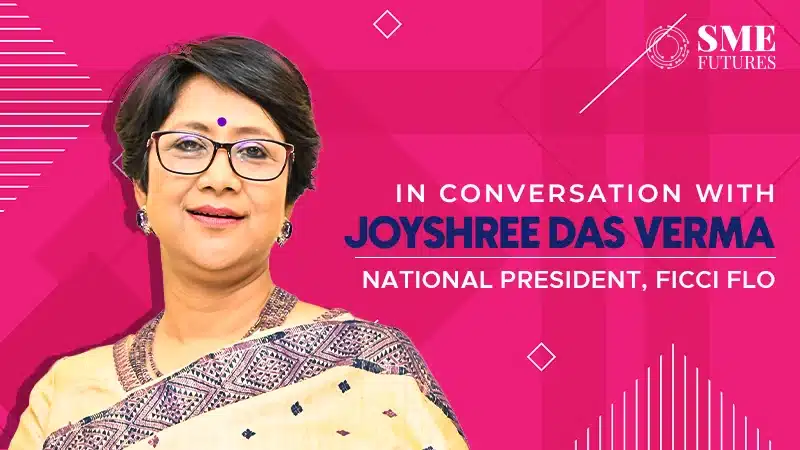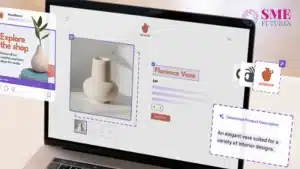In a rapidly evolving business landscape, women entrepreneurs in India face distinct challenges, ranging from access to finance to limited market visibility. Leading the charge to address these issues is Joyshree Das Verma, the 41st National President of FICCI FLO. Under her leadership, the organisation has embraced the theme of “Collective Vision, Collaborative Action,” driving initiatives that empower women across urban and rural India. Through strategic partnerships, innovative skilling programmes, and policy advocacy, FLO is building a more inclusive ecosystem where women entrepreneurs can thrive.
In this conversation, Joyshree Das Verma shares her plans for fostering entrepreneurial excellence, her insights about the key challenges that women face, and FLO’s efforts to empower the next generation of female leaders. From embracing digital tools to forging global collaborations, her vision encapsulates the power of collective action to create meaningful change.
Edited excerpts:
Under your leadership, the theme is “Collective Vision, Collaborative Action.” How do you plan to implement this vision within FLO, and what specific initiatives are you most excited about?
As the President of FICCI FLO, my focus remains on advancing the theme of “Collective Vision, Collaborative Action” by creating impactful initiatives for women across the country. Hence, we are driving empowerment through digital literacy, partnering with organisations like Microsoft, NIIT, and Amity to enhance both rural and urban education. Renewing the MOU with ICA Eduskills Pvt. Ltd. for FY 2024-25, we aim to provide young women with skilling opportunities. Internationally, we are collaborating with the US, UK, and German consulates on critical issues like climate change, inclusivity, and gender equity, while facilitating business exchanges.
Additionally, we are supporting Indian companies in the US via the SelectUSA programme and empowering graduates through the Smart Fellowship Programme with Nimaya. For the first quarter, our impact number stands at 102014. We have also increased our outreach – currently, FLO has 20 active chapters and the Young FICCI Ladies Organisation or YFLO features 4 chapters, with the Head Office being centred in Delhi.
What are the key challenges that women entrepreneurs still face today, and how is FICCI FLO addressing them through its programmes?
Women entrepreneurs in India face significant challenges, with the World Economic Forum’s Global Gender Gap Report 2023 ranking India 135th out of 146 countries in female labour force participation. National surveys show that women represent only 20% of the MSME sector. Key barriers include difficulty obtaining financing due to lack of collateral, balancing personal and professional responsibilities, limited market access, and insufficient networking and mentorship opportunities. FLO addresses these challenges through workshops, seminars, and capacity-building initiatives aimed at fostering entrepreneurial excellence. We are also expanding outreach in rural areas with awareness and training programmes, forging alliances with banks and NBFCs to improve access to financing and providing support for immigration and visa procedures to help women entrepreneurs grow their businesses internationally.
Also, FLO MSME Assist is a dedicated vertical that aids and supports women entrepreneurs who want to start or grow their MSME businesses. The MSME Assist Cell equips women with essential tools for success in the MSME sector by offering access to valuable resources, mentoring, and handholding throughout their entrepreneurial journey. Similarly, FLO has a Start-up Cell for women-led businesses. This cell supports savvy womenpreneurs through its 40 years of experience, serving over 9,600 women entrepreneurs and professionals across chapters. It fosters innovation and growth among women looking to make their mark in the start-up ecosystem.
Given the current economic challenges in India, including inflation and slow growth, how do you see these factors affecting women-led businesses specifically? What strategies will you suggest to them to navigate these tough times?
The current economic challenges, including inflation and slow growth, disproportionately affect women-led businesses, especially in sectors where margins are tight, and resources are limited. Rising input costs, reduced consumer spending, and difficulty accessing credit further exacerbate these challenges. To navigate these tough times, women entrepreneurs should focus on cost efficiency, diversify their product or service offerings, and leverage digital platforms to reach a broader audience. FLO supports these efforts through training programmes, digital literacy initiatives, and partnerships with financial institutions to ease access to credit. For instance, we have partnered with the Mukul Madhav Foundation (MMF) under a signed MoU, to provide a grant of 5 lakhs per chapter, amounting to nearly 1 crore, with the aim of uplifting rural and semi-urban communities by enhancing economic conditions, improving employability, and fostering sustainable livelihood models.
This collaboration focuses on empowering women through skills training and facilitating their employment across diverse sectors. We also encourage women to build strong networks and collaborate to share resources, creating more resilient business models.
Digital transformation is reshaping businesses globally. How is FLO helping women entrepreneurs embrace digital tools and technology, especially in traditionally offline sectors?
FLO is actively helping women entrepreneurs embrace digital transformation, especially in traditionally offline sectors, by focusing on digital literacy and skilling. Through partnerships with Microsoft, NIIT, and Amity, we aim to bridge the digital divide and provide practical guidance on using digital devices and the Internet. Our programmes equip women with essential digital skills, empowering them to navigate the evolving business landscape and achieve economic independence. By offering online training, workshops, and resources, we ensure that women in both rural and urban areas benefit from technological advancements, enabling them to scale their businesses and thrive in the digital economy.
Mentorship and networking are often highlighted as critical success factors for entrepreneurs. How does FLO facilitate mentorship opportunities, and what advice do you have for women looking to build strong professional networks?
FLO facilitates mentorship and networking for women entrepreneurs by offering tailored programmes, workshops, and strategic partnerships with institutions like the Institute of Cost Accountants of India (ICMAI). These collaborations enhance financial literacy and provide access to mentors who offer guidance in areas like fashion, jewellery, and other key sectors. FLO also organises networking events, creating platforms for women to connect, share experiences, and expand their market reach.
My advice to women entrepreneurs is to actively seek out networking opportunities, join professional communities, and build relationships with mentors. Strong networks not only provide business insights but also support and encourage growth through shared experiences and collaborations.
What are some of the policy changes that are essential to further support female-led businesses in India? Has FLO proposed or is working on any specific policy initiatives?
Accelerating women’s entrepreneurship in India could create over 30 million women-owned enterprises and generate 150 to 170 million jobs. Currently, women-owned businesses account for 20.5% of India’s 63 million MSMEs, with over 22 million women-led businesses registered on the Udyam Portal. However, only 19% of the 432 million working-age women engage in formal, paid work, and the Total Early-stage Entrepreneurial Activity (TEA) rate for women is just 2.6%. Hence, FLO is advocating for policy changes to enhance access to finance, legal protections, and gender-sensitive business practices. Collaborating with policymakers, FLO pushes for gender equality in workplaces and education while forming alliances with NGOs and government bodies to expand its impact.
For instance, the FLO Advocacy and Legal Cell is focused on empowering women by providing political and legal tools to influence gender discourse. Its key objectives include identifying gaps in policies and laws affecting women, designing advocacy tools, and collaborating with government bodies for policy changes. The cell also aims to change social perceptions through creative initiatives, foster partnerships with national and local organisations, and create platforms for knowledge sharing. Additionally, it conducts legal literacy and capacity-building programmes to raise awareness of women’s rights and encourages members to actively promote legal education on these issues.
Separately, the FLO Digital Literacy Initiative aims to empower young girls with computer coding skills, preparing them for future opportunities in technology. These initiatives, alongside policy advocacy, aim to break down barriers and unleash the full potential of women entrepreneurs.
What steps is FLO taking to inspire and support the next generation of young women entrepreneurs? Are there specific programmes or initiatives targeting young women at the start of their careers?
FLO is actively inspiring and supporting the next generation of young women entrepreneurs through targeted programmes aimed at skill development, digital literacy, and entrepreneurship. A key initiative is the YFLO, established in 2004, which serves as a unique platform for women aged 20-39 to engage in networking, learning, and launching entrepreneurial ideas.
YFLO provides workshops, vocational training, seminars, and panel discussions to promote professional excellence. YFLO’s initiatives, like the ‘Katran’ project, focus on teaching women to upcycle waste cloth into valuable goods, fostering sustainability and entrepreneurship. Additionally, FLO partners with educational institutions and industry leaders to equip young women with contemporary skills, ensuring that they are prepared for today’s market needs.
As the 41st National President of FLO, what has been your biggest learning so far, and what motivates you to continue advocating for women’s empowerment in business?
My most significant learning so far has been witnessing the immense potential of women when they are provided with the right support and resources – the resilience and creativity demonstrated by women entrepreneurs inspire me daily. What motivates me to continue advocating for women’s empowerment in business is the transformative impact it has on society. Empowering women not only enhances economic growth but also fosters a more inclusive and equitable world. I am driven by the belief that every woman deserves the opportunity to thrive and contribute her unique talents to the economy. This fuels my passion for creating initiatives that break down barriers and open doors for women across India.










